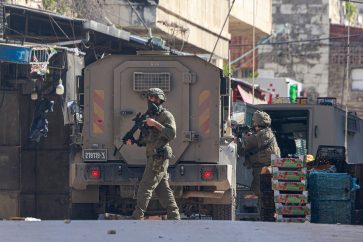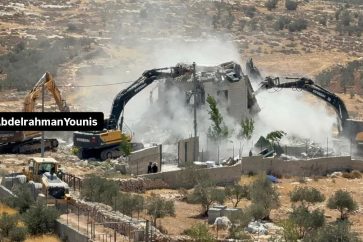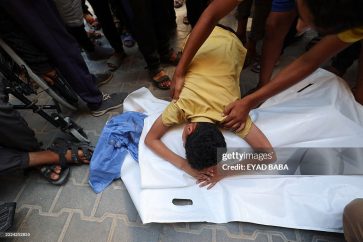On Sunday morning, large groups of Israeli settlers stormed Al-Aqsa Mosque under heavy protection from the Israeli occupation police, through the Mughrabi Gate.
The Islamic Endowments Department in Jerusalem reported that hundreds of settlers stormed Al-Aqsa Mosque in scattered groups, where they received explanations about the alleged “Temple” and conducted provocative tours of the mosque’s courtyards. A number of them performed Talmudic and Torah rituals, particularly on the eastern side near the Dome of the Rock, before leaving through the Chain Gate.
This coincided with strict restrictions imposed by the occupation forces at the entrances to the Old City and Al-Aqsa Mosque. They installed dozens of iron barriers and detained Palestinians to check their IDs and belongings, in an attempt to limit their access to the mosque.
The occupation authorities also closed all passages and roads leading to the Old City, as well as the gates of Al-Aqsa Mosque, amid a heavy deployment of police and special forces, transforming the Holy City into a closed military barracks. These raids come in response to calls by the so-called “Temple Groups,” which called for widespread raids on the mosque during Easter, in an attempt to bring the so-called “Passover offerings” into the mosque, a blatant violation of its sanctity and the feelings of Muslims.
Amid this tense atmosphere, fears are growing of further tension and violations against Al-Aqsa Mosque, given the escalating frequency of raids and the continued tightening of Israeli restrictions on Palestinians in occupied Jerusalem.
The occupation prevents Christians from the West Bank from attending Palm Sunday in Jerusalem
In a related context, the Israeli occupation prevented thousands of Christians from the West Bank from reaching occupied Jerusalem on Sunday to participate in Palm Sunday.
Eastern and Western Christian churches celebrated the occasion at the Church of the Holy Sepulchre in the Old City of Jerusalem, amid the absence of thousands of Christians from the West Bank due to the strict Israeli restrictions.
The occupation forces imposed military measures at the city’s entrances, tightened their presence at the checkpoints surrounding the Old City, and continued to require special permits to enter Jerusalem.
According to Father Ibrahim Faltas, Deputy Superior General of the Custody of the Holy Land, the occupation has granted only 6,000 permits, out of approximately 50,000 Christians residing in the West Bank.
In light of the ongoing Israeli aggression on the Gaza Strip since October 7, churches have canceled all celebrations, limiting their activities to religious rites and prayers, with prayers for peace and justice in the Holy Land.
It is worth noting that Easter, or “Resurrection Sunday,” coincides this year for both Eastern and Western Christian denominations. Palm Sunday marks the beginning of Holy Week and commemorates the entry of Jesus Christ into the Holy City.
West Bank’s Christians denied entry to occupied Jerusalem on Palm Sundayhttps://t.co/1dhdNgL481 pic.twitter.com/6FaWASIveR
— WAFA News Agency – English (@WAFANewsEnglish) April 13, 2025
Jerusalem is currently witnessing strict measures and a heavy deployment of occupation forces in the Old City and around the Church of the Holy Sepulchre. Checkpoints and barriers have been set up at the city’s entrances, obstructing thousands of worshippers and pilgrims from reaching their places of worship.
Gaza Orthodox Church Celebrates Palm Sunday Amid War
The Orthodox Church in the Gaza Strip celebrated Palm Sunday this morning, Sunday, at St. Porphyrius Church, with the participation of members of the Christian community who carried olive branches and palm fronds to commemorate the entry of Jesus Christ into Jerusalem.
During the mass, clerics noted that this is the third feast the church has celebrated amid the ongoing war. They emphasized that the continuation of these rituals despite the bombing and suffering reflects the resilience of the Christian community and its determination to cling to faith and hope.
The clerics also called for peace and mercy, offering prayers for the souls of the martyrs and missing, and praying for security and justice to prevail in the land of Palestine.
Source: Agencies (edited by Al-Manar English Website)




